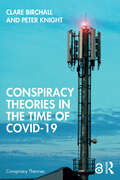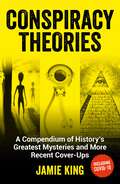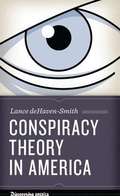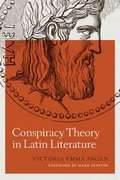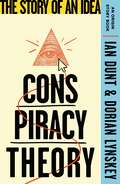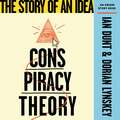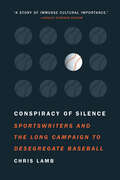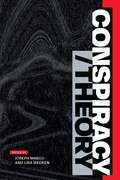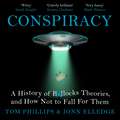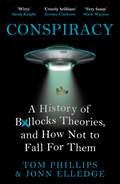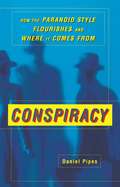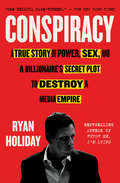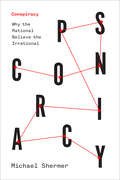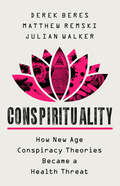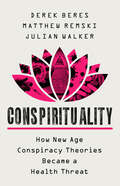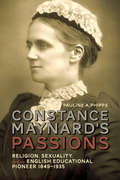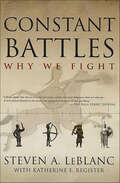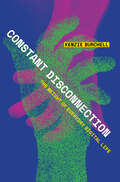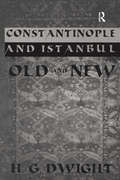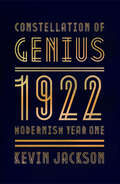- Table View
- List View
Conspiracy Theories in the Time of Covid-19 (Conspiracy Theories)
by Peter Knight Clare BirchallConspiracy Theories in the Time of Covid-19 provides a wide-ranging analysis of the emergence and development of conspiracy theories during the Covid-19 pandemic, with a focus on the US and the UK. The book combines digital methods analysis of large datasets assembled from social media with politically and culturally contextualised close readings informed by cultural studies. In contrast to other studies which often have an alarmist take on the "infodemic," it places Covid-19 conspiracy theories in a longer historical perspective. It also argues against the tendency to view conspiracy theories as merely evidence of a fringe or pathological way of thinking. Instead, the starting assumption is that conspiracy theories, including Covid-19 conspiracy theories, often reflect genuine and legitimate concerns, even if their factual claims are wide of the mark. The authors examine the nature and origins of the conspiracy theories that have emerged; the identity and rationale of those drawn to Covid-19 conspiracism; how these conspiracy theories fit within the wider political, economic and technological landscape of the online information environment; and proposed interventions from social media platforms and regulatory agencies. This book will appeal to anyone interested in conspiracy theories, misinformation, culture wars, social media, and contemporary society.
Conspiracy Theories in the Time of Covid-19 (Conspiracy Theories)
by Peter Knight Clare BirchallConspiracy Theories in the Time of Covid-19 provides a wide-ranging analysis of the emergence and development of conspiracy theories during the Covid-19 pandemic, with a focus on the US and the UK.The book combines digital methods analysis of large datasets assembled from social media with politically and culturally contextualised close readings informed by cultural studies. In contrast to other studies which often have an alarmist take on the "infodemic," it places Covid-19 conspiracy theories in a longer historical perspective. It also argues against the tendency to view conspiracy theories as merely evidence of a fringe or pathological way of thinking. Instead, the starting assumption is that conspiracy theories, including Covid-19 conspiracy theories, often reflect genuine and legitimate concerns, even if their factual claims are wide of the mark. The authors examine the nature and origins of the conspiracy theories that have emerged; the identity and rationale of those drawn to Covid-19 conspiracism; how these conspiracy theories fit within the wider political, economic and technological landscape of the online information environment; and proposed interventions from social media platforms and regulatory agencies.This book will appeal to anyone interested in conspiracy theories, misinformation, culture wars, social media and contemporary society.The Open Access version of this book, available at http://www.taylorfrancis.com, has been made available under a Creative Commons Attribution (CC-BY) 4.0 license.
Conspiracy Theories: A Compendium of History's Greatest Mysteries and More Recent Cover-Ups
by Jamie KingWhere did the Coronavirus outbreak originate and was the pandemic predicted? Did aliens help to build the Sphinx and Great Pyramid of Giza? Is the food industry colluding to make us addicted to sugar? Prepare yourself for some startling revelations on these topics and many more in this updated and expanded compendium of the world’s scariest and strangest conspiracy theories.
Conspiracy Theories: A Compendium of History's Greatest Mysteries and More Recent Cover-Ups
by Jamie KingWhere did the Coronavirus outbreak originate and was the pandemic predicted? Did aliens help to build the Sphinx and Great Pyramid of Giza? Is the food industry colluding to make us addicted to sugar? Prepare yourself for some startling revelations on these topics and many more in this updated and expanded compendium of the world’s scariest and strangest conspiracy theories.
Conspiracy Theory in America
by Lance Dehaven-SmithEver since the Warren Commission concluded that a lone gunman assassinated President John F. Kennedy, people who doubt that finding have been widely dismissed as conspiracy theorists, despite credible evidence that right-wing elements in the CIA, FBI, and Secret Service--and possibly even senior government officials--were also involved. Why has suspicion of criminal wrongdoing at the highest levels of government been rejected out-of-hand as paranoid thinking akin to superstition? Conspiracy Theory in America investigates how the Founders' hard-nosed realism about the likelihood of elite political misconduct--articulated in the Declaration of Independence--has been replaced by today's blanket condemnation of conspiracy beliefs as ludicrous by definition. Lance deHaven-Smith reveals that the term "conspiracy theory" entered the American lexicon of political speech to deflect criticism of the Warren Commission and traces it back to a CIA propaganda campaign to discredit doubters of the commission's report. He asks tough questions and connects the dots among five decades' worth of suspicious events, including the assassinations of John and Robert Kennedy, the attempted assassinations of George Wallace and Ronald Reagan, the crimes of Watergate, the Iran-Contra arms-for-hostages deal, the disputed presidential elections of 2000 and 2004, the major defense failure of 9/11, and the subsequent anthrax letter attacks. Sure to spark intense debate about the truthfulness and trustworthiness of our government, Conspiracy Theory in America offers a powerful reminder that a suspicious, even radically suspicious, attitude toward government is crucial to maintaining our democracy.
Conspiracy Theory in Latin Literature
by Victoria Emma PaganConspiracy theory as a theoretical framework has emerged only in the last twenty years; commentators are finding it a productive way to explain the actions and thoughts of individuals and societies. In this compelling exploration of Latin literature, Pagán uses conspiracy theory to illuminate the ways that elite Romans invoked conspiracy as they navigated the hierarchies, divisions, and inequalities in their society. By seeming to uncover conspiracy everywhere, Romans could find the need to crush slave revolts, punish rivals with death or exile, dismiss women, denigrate foreigners, or view their emperors with deep suspicion. Expanding on her earlier Conspiracy Narratives in Roman History, Pagán here interprets the works of poets, satirists, historians, and orators—Juvenal, Tacitus, Suetonius, Terence, and Cicero, among others—to reveal how each writer gave voice to fictional or real actors who were engaged in intrigue and motivated by a calculating worldview. Delving into multiple genres, Pagán offers a powerful critique of how conspiracy and conspiracy theory can take hold and thrive when rumor, fear, and secrecy become routine methods of interpreting (and often distorting) past and current events. In Roman society, where knowledge about others was often lacking and stereotypes dominated, conspiracy theory explained how the world worked. The persistence of conspiracy theory, from antiquity to the present day, attests to its potency as a mechanism for confronting the frailties of the human condition.
Conspiracy Theory: The Story of an Idea (An Origin Story Book) (An Origin Story Book)
by Dorian Lynskey Ian DuntAN ORIGIN STORY BOOK'Provides clarity, scholarship, wit and essential insight into why our world is the way it is' Adam Rutherford'I wish I could make Ian and Dorian's work mandatory' Sathnam SangheraWhat makes people believe in conspiracy theories? Why have they taken over our political sphere? And how do we counter them before it's too late?The world has always had conspiracy theories. From the Illuminati to the deep state, the JFK assassination to the death of Princess Diana - there have always been those who believe that events are manipulated by shadowy forces with sinister intent. But in recent years, conspiracism has colonised the mainstream. These days, it is a booming industry, a political strategy and a pseudo-religion - and it's threatening the foundations of liberal democracy.Where once political battles were fought over ideas and values, it now feels as though we're arguing over the nature of reality itself. The problem is bigger than lizard people or UFOs: left unchecked, conspiracy theories have the power to warp the fabric of society and justify unspeakable crimes.In Conspiracy Theory: The Story of an Idea, Ian Dunt and Dorian Lynskey pull back the curtain on conspiracy theories: where they come from, who promotes them, how they work and what they're doing to us. From biblical myth to online hysteria, this book explains what happens when the human gift for storytelling goes wrong - and how we might restore our common reality.
Conspiracy Theory: The Story of an Idea (An Origin Story Book) (An Origin Story Book)
by Dorian Lynskey Ian DuntAN ORIGIN STORY BOOK'Provides clarity, scholarship, wit and essential insight into why our world is the way it is' Adam Rutherford'I wish I could make Ian and Dorian's work mandatory' Sathnam SangheraWhat makes people believe in conspiracy theories? Why have they taken over our political sphere? And how do we counter them before it's too late?The world has always had conspiracy theories. From the Illuminati to the deep state, the JFK assassination to the death of Princess Diana - there have always been those who believe that events are manipulated by shadowy forces with sinister intent. But in recent years, conspiracism has colonised the mainstream. These days, it is a booming industry, a political strategy and a pseudo-religion - and it's threatening the foundations of liberal democracy.Where once political battles were fought over ideas and values, it now feels as though we're arguing over the nature of reality itself. The problem is bigger than lizard people or UFOs: left unchecked, conspiracy theories have the power to warp the fabric of society and justify unspeakable crimes.In Conspiracy Theory: The Story of an Idea, Ian Dunt and Dorian Lynskey pull back the curtain on conspiracy theories: where they come from, who promotes them, how they work and what they're doing to us. From biblical myth to online hysteria, this book explains what happens when the human gift for storytelling goes wrong - and how we might restore our common reality.
Conspiracy Theory: The Story of an Idea (An Origin Story Book) (An Origin Story Book)
by Dorian Lynskey Ian DuntAN ORIGIN STORY BOOK'Provides clarity, scholarship, wit and essential insight into why our world is the way it is' Adam Rutherford'I wish I could make Ian and Dorian's work mandatory' Sathnam SangheraWhat makes people believe in conspiracy theories? Why have they taken over our political sphere? And how do we counter them before it's too late?The world has always had conspiracy theories. From the Illuminati to the deep state, the JFK assassination to the death of Princess Diana - there have always been those who believe that events are manipulated by shadowy forces with sinister intent. But in recent years, conspiracism has colonised the mainstream. These days, it is a booming industry, a political strategy and a pseudo-religion - and it's threatening the foundations of liberal democracy.Where once political battles were fought over ideas and values, it now feels as though we're arguing over the nature of reality itself. The problem is bigger than lizard people or UFOs: left unchecked, conspiracy theories have the power to warp the fabric of society and justify unspeakable crimes.In Conspiracy Theory: The Story of an Idea, Ian Dunt and Dorian Lynskey pull back the curtain on conspiracy theories: where they come from, who promotes them, how they work and what they're doing to us. From biblical myth to online hysteria, this book explains what happens when the human gift for storytelling goes wrong - and how we might restore our common reality.
Conspiracy of Silence: Sportswriters and the Long Campaign to Desegregate Baseball
by Chris LambThe campaign to desegregate baseball was one of the most important civil rights stories of the 1930s and 1940s. But most of white America knew nothing about this story because mainstream newspapers said little about the color line and still less about the efforts to end it. Even today, as far as most Americans know, the integration of baseball revolved around Branch Rickey&’s signing of Jackie Robinson to the Brooklyn Dodgers&’ organization in 1945. This book shows how Rickey&’s move, critical as it may have been, came after more than a decade of work by Black and left-leaning journalists to desegregate the game. Drawing on hundreds of newspaper articles and interviews with journalists, Chris Lamb reveals how differently Black and white newspapers, and Black and white America, viewed racial equality. Between 1933 and 1945, Black newspapers and the communist Daily Worker published hundreds of articles and editorials calling for an end to baseball&’s color line, while white mainstream sportswriters perpetuated the color line by participating in what their Black counterparts called a &“conspiracy of silence.&” The alternative presses&’ efforts to end baseball&’s color line, chronicled for the first time in Conspiracy of Silence, constitute one of the great untold stories of baseball—and the civil rights movement.
Conspiracy/Theory
by Joseph Masco and Lisa WedeenIn an era of intensified information warfare, ranging from global disinformation campaigns to individual attention hacks, what are the compelling terms for political judgment? How are we to build the knowledge needed to recognize and address important forms of harm when critical information is either not to be trusted or kept hidden? Rather than approach conspiratorial narrative as an irrational response to an obviously decipherable reality, Conspiracy/Theory identifies important affinities between conspiracy theory and critical theory. It recognizes the motivation people have—in their capacities as experts, theorists, and ordinary citizens—to search for patterns in events, to uncover what is covert and attend to dimensions of life that might be hiding in plain sight. If it seems strange that so many find themselves living in incommensurable, disorienting realities, the multidisciplinary contributors to Conspiracy/Theory explore how and why that came to be. Across history and geography, contributors inquire into the affects and imaginaries of political mobilization, tracking counterrevolutionary projects while acknowledging collective futures that demand conspiratorial engagement.Contributors. Nadia Abu El-Haj, Hussein Ali Agrama, Kathleen Belew, Elizabeth Anne Davis, Joseph Dumit, Faith Hillis, Lochlann Jain, Demetra Kasimis, Susan Lepselter, Darryl Li, Louisa Lombard, Joseph Masco, Robert Meister, Timothy Melley, Rosalind C. Morris, George Shulman, Lisa Wedeen
Conspiracy: A History of Boll*cks Theories, and How Not to Fall for Them
by Tom Phillips Jonn ElledgeTom Phillips (Humans; Truth) and Jonn Elledge (The Compendium of Not Quite Everything) team up to debunk the greatest conspiracy theories humans have ever espoused - to teach us how not to fall for them.From the Satanic Panic to the anti-vaxx movement, it's always been human nature to believe we're being lied to by the powers that be (and sometimes, to be fair, we absolutely are).But while it can be fun to indulge in a bit of Deep State banter on the family Whatsapp group, recent times have shown us that some of these theories have taken on a life of their own - and in our dogged quest for the truth, it appears we might actually be doing it some damage.In Conspiracy, Tom Phillips and Jonn Elledge take us on a fascinating, insightful and often hilarious journey through conspiracy theories old and new, to try and answer an important question: how can we learn to log off the QAnon message boards, and start trusting hard evidence again?Praise for the Brief History series:'Witty, entertaining and slightly distressing' Sarah Knight, author of The Life-Changing Magic of Not Giving a F*ck'Brilliant. Utterly, utterly brilliant' Jeremy Clarkson'Very funny' Mark Watson'Both readable and entertaining' Telegraph(P) 2022 Headline Publishing Group Ltd
Conspiracy: A History of Boll*cks Theories, and How Not to Fall for Them
by Tom Phillips Jonn Elledge'Uproarious . . . [Phillips and Elledge] pair the abundant good humour of this book with a warning about the corrosive effects of conspiracy theories' The TimesFrom the Satanic Panic to the anti-vaxx movement, the moon landing to Pizzagate, it's always been human nature to believe we're being lied to by the powers that be (and sometimes, to be fair, we absolutely are).But while it can be fun to indulge in a bit of Deep State banter on the group chat, recent times have shown us that some of these theories have taken on a life of their own - and in our dogged quest for the truth, it appears we might actually be doing it some damage.In Conspiracy, Tom Phillips and Jonn Elledge take us on a fascinating, insightful and often hilarious journey through conspiracy theories old and new, to try and answer a vital question for our times: how can we learn to log off the QAnon message boards, and start trusting hard evidence again?Praise for the Brief History series:'Witty, entertaining and slightly distressing... You should probably read it' Sarah Knight, author of The Life-Changing Magic of Not Giving a F*ck'Brilliant. Utterly, utterly brilliant' Jeremy Clarkson'Very funny' Mark Watson'Both readable and entertaining' Telegraph
Conspiracy: A History of Boll*cks Theories, and How Not to Fall for Them
by Tom Phillips Jonn Elledge'Uproarious . . . [Phillips and Elledge] pair the abundant good humour of this book with a warning about the corrosive effects of conspiracy theories' The TimesFrom the Satanic Panic to the anti-vaxx movement, the moon landing to Pizzagate, it's always been human nature to believe we're being lied to by the powers that be (and sometimes, to be fair, we absolutely are).But while it can be fun to indulge in a bit of Deep State banter on the group chat, recent times have shown us that some of these theories have taken on a life of their own - and in our dogged quest for the truth, it appears we might actually be doing it some damage.In Conspiracy, Tom Phillips and Jonn Elledge take us on a fascinating, insightful and often hilarious journey through conspiracy theories old and new, to try and answer a vital question for our times: how can we learn to log off the QAnon message boards, and start trusting hard evidence again?Praise for the Brief History series:'Witty, entertaining and slightly distressing... You should probably read it' Sarah Knight, author of The Life-Changing Magic of Not Giving a F*ck'Brilliant. Utterly, utterly brilliant' Jeremy Clarkson'Very funny' Mark Watson'Both readable and entertaining' Telegraph
Conspiracy: How The Paranoid Style Flourishes and Where It Comes From
by Daniel PipesIn this brilliant and provocative work, Daniel Pipes offers a fascinating analysis of conspiracy theories in the West and the terrible impact they have had. He shows how, beginning with the Crusades, Europe developed two strands of conspiracism. One took the form of secret societies from the Knights Templar through the Freemasons to the Council on Foreign Relations. A second insisted that "international Jewry" runs the world. Pipes delineates the fear that one or the other of these agents engineered the French and Russian revolutions, two world wars, and all other key events of modern history. He shows the staggering consequences of conspiracy theories in the era when Hitler and Stalin reached power and then, in the aftermath of 1945, the migration of this way of thinking from the halls of power in the West to the political and geographic margins. To anyone who has ever heard a friend or relative say, "Don't believe what you read in the papers," Conspiracy offers a spellbinding survey - and a wakeup call.
Conspiracy: Peter Thiel, Hulk Hogan, Gawker, and the Anatomy of Intrigue
by Ryan HolidayIn the tradition of Janet Malcolm's THE JOURNALIST AND THE MURDERER and Robert Greene's THE 48 LAWS OF POWER, author Ryan Holiday examines the case that rocked the media world--and the billionaire mastermind behind itIn 2007, a short blogpost on Valleywag, the Silicon Valley-vertical of Gawker Media, outed PayPal founder and billionaire investor Peter Thiel as gay. Thiel's sexuality had been known to close friends and family, but he didn't consider himself a public figure, and believed the information was private. This post would be the casus belli for a meticulously plotted conspiracy that would end nearly a decade later with a $140 million dollar judgment against Gawker, its bankruptcy and with Nick Denton, Gawker's CEO and founder, out of a job. Only later would the world learn that Gawker's demise was not incidental--it had been masterminded by Thiel.For years, Thiel had searched endlessly for a solution to what he'd come to call the "Gawker Problem." When an unmarked envelope delivered an illegally recorded sex tape of Hogan with his best friend's wife, Gawker had seen the chance for millions of pageviews and to say the things that others were afraid to say. Thiel saw their publication of the tape as the opportunity he was looking for. He would come to pit Hogan against Gawker in a multi-year proxy war through the Florida legal system, while Gawker remained confidently convinced they would prevail as they had over so many other lawsuit--until it was too late. The verdict would stun the world and so would Peter's ultimate unmasking as the man who had set it all in motion. Why had he done this? How had no one discovered it? What would this mean--for the First Amendment? For privacy? For culture?In Holiday's masterful telling of this nearly unbelievable conspiracy, informed by interviews with all the key players, this case transcends the narrative of how one billionaire took down a media empire or the current state of the free press. It's a study in power, strategy, and one of the most wildly ambitious--and successful--secret plots in recent memory.Some will cheer Gawker's destruction and others will lament it, but after reading these pages--and seeing the access the author was given--no one will deny that there is something ruthless and brilliant about Peter Thiel's shocking attempt to shake up the world.
Conspiracy: Why the Rational Believe the Irrational
by Michael ShermerBest-selling author Michael Shermer presents an overarching theory of conspiracy theories—who believes them and why, which ones are real, and what we should do about them.Nothing happens by accident, everything is connected, and there are no coincidences: that is the essence of conspiratorial thinking. Long a fringe part of the American political landscape, conspiracy theories are now mainstream: 147 members of Congress voted in favor of objections to the 2020 presidential election based on an unproven theory about a rigged electoral process promoted by the mysterious group QAnon. But this is only the latest example in a long history of ideas that include the satanic panics of the 1980s, the New World Order and Vatican conspiracy theories, fears about fluoridated water, speculations about President John F. Kennedy's assassination, and the notions that the Sandy Hook massacre was a false-flag operation and 9/11 was an inside job. In Conspiracy, Michael Shermer presents an overarching review of conspiracy theories—who believes them and why, which ones are real, and what we should do about them. Trust in conspiracy theories, he writes, cuts across gender, age, race, income, education level, occupational status—and even political affiliation. One reason that people believe these conspiracies, Shermer argues, is that enough of them are real that we should be constructively conspiratorial: elections have been rigged (LBJ's 1948 Senate race); medical professionals have intentionally harmed patients in their care (Tuskegee); your government does lie to you (Watergate, Iran-Contra, and Afghanistan); and, tragically, some adults do conspire to sexually abuse children. But Shermer reveals that other factors are also in play: anxiety and a sense of loss of control play a role in conspiratorial cognition patterns, as do certain personality traits. This engaging book will be an important read for anyone concerned about the future direction of American politics, as well as anyone who's watched friends or family fall into patterns of conspiratorial thinking.
Conspirituality: How New Age Conspiracy Theories Became a Health Threat
by Julian Walker Derek Beres Matthew RemskiConspirituality takes a deep dive into the troubling phenomenon of influencers who have curdled New Age spirituality and wellness with the politics of paranoia—peddling vaccine misinformation, tales of child trafficking, and wild conspiracy theories. In the early days of the COVID-19 pandemic, a disturbing social media trend emerged: a large number of yoga instructors and alt-health influencers were posting stories about a secretive global cabal bent on controlling the world&’s population with a genocidal vaccine. Instagram feeds that had been serving up green smoothie recipes and Mary Oliver poems became firehoses of Fox News links, memes from 4chan, and prophecies of global transformation. Since May 2020, Derek Beres, Matthew Remski and Julian Walker have used their Conspirituality podcast to expose countless facets of the intersection of alt-health practitioners with far-right conspiracy trolls. Now this expansive and revelatory book unpacks the follies, frauds, cons and cults that dominate the New Age and wellness spheres and betray the trust of people who seek genuine relief in this uncertain age. With analytical rigor and irreverent humor, Conspirituality offers an antidote to our times, helping readers recognize wellness grifts, engage with loved ones who've fallen under the influence, and counter lies and distortions with insight and empathy.
Conspirituality: How New Age Conspiracy Theories Became a Public Health Threat
by Julian Walker Derek Beres Matthew RemskiConspirituality takes a deep dive into the troubling phenomenon of influencers who have curdled New Age spirituality and wellness with the politics of paranoia—peddling vaccine misinformation, tales of child trafficking, and wild conspiracy theories.In the early days of the COVID-19 pandemic, a disturbing social media trend emerged: a large number of yoga instructors and alt-health influencers were posting stories about a secretive global cabal bent on controlling the world&’s population with a genocidal vaccine. Instagram feeds that had been serving up green smoothie recipes and Mary Oliver poems became firehoses of Fox News links, memes from 4chan, and prophecies of global transformation.Since May 2020, Derek Beres, Matthew Remski and Julian Walker have used their Conspirituality podcast to expose countless facets of the intersection of alt-health practitioners with far-right conspiracy trolls. Now this expansive and revelatory book unpacks the follies, frauds, cons and cults that dominate the New Age and wellness spheres and betray the trust of people who seek genuine relief in this uncertain age. Each of the three authors has witnessed firsthand the use of fear-based political agendas to manipulate the human desire for spiritual fulfillment. They throw a spotlight on the telltale signs of cult dynamics and expose how influencers have stoked suspicion of public health initiatives. And they show how charlatans and pseudo-doctors encourage their followers to oppose mainstream advice as a form of spiritual quest. With analytical rigor and flashes of irreverent humor, Conspirituality offers an antidote to our times, helping readers recognize wellness grifts, engage with loved ones who've fallen under the influence, and counter lies and distortions with insight and empathy.
Constance Maynard's Passions
by Pauline A. PhippsSuccessful but self-tormented, English educational pioneer Constance Maynard (1849-1935) was a deeply religious evangelical Christian whose personal atonement theology demanded that one resist carnal feelings to achieve personal salvation. As the founder of Westfield College at the University of London, Maynard championed women's access to a university education. As the college's first principal, she also engaged in a string of passionate relationships with college women in which she imagined love as God's gift as well as a test of her faith.Using Maynard's extensive personal papers, especially her diaries and autobiography, Pauline A. Phipps examines how the language of her faith offered Maynard the means with which to carve out an independent career and to forge a distinct same-sex sexual self-consciousness in an era when middle-class women were expected to be subservient to men and confined to the home. Constance Maynard's Passions is the fascinating account of a life which confounds the usual categories of faith, gender, and sexuality.
Constant Battles: Why We Fight
by Steven A. LeBlanc Katherine E. RegisterWith armed conflict in the Persian Gulf now upon us, Harvard archaeologist Steven LeBlanc takes a long-term view of the nature and roots of war, presenting a controversial thesis: The notion of the "noble savage" living in peace with one another and in harmony with nature is a fantasy. In Constant Battles: The Myth of the Peaceful, Noble Savage, LeBlanc contends that warfare and violent conflict have existed throughout human history, and that humans have never lived in ecological balance with nature. The start of the second major U.S. military action in the Persian Gulf, combined with regular headlines about spiraling environmental destruction, would tempt anyone to conclude that humankind is fast approaching a catastrophic end. But as LeBlanc brilliantly argues, the archaeological record shows that the warfare and ecological destruction we find today fit into patterns of human behavior that have gone on for millions of years.Constant Battles surveys human history in terms of social organization-from hunter gatherers, to tribal agriculturalists, to more complex societies. LeBlanc takes the reader on his own digs around the world -- from New Guinea to the Southwestern U.S. to Turkey -- to show how he has come to discover warfare everywhere at every time. His own fieldwork combined with his archaeological, ethnographic, and historical research, presents a riveting account of how, throughout human history, people always have outgrown the carrying capacity of their environment, which has led to war. Ultimately, though, LeBlanc's point of view is reassuring and optimistic. As he explains the roots of warfare in human history, he also demonstrates that warfare today has far less impact than it did in the past. He also argues that, as awareness of these patterns and the advantages of modern technology increase, so does our ability to avoid war in the future.
Constant Disconnection: The Weight of Everyday Digital Life
by Kenzie BurchellThe weight of constant digital connection is the default condition of working life, home life, and everyday personal life – driving us to engage more with platforms than with people, a new state of constant disconnection that we cannot escape. Overflowing email inboxes, deluges of mobile phone notifications and torrents of social media posts—the flow of communication in its abundance is today's individualized interface for interpersonal and professional practices. Communication technologies and their use are both the needle and the thread of the wider social tapestry of everyday contemporary life. This ever-changing communication environment is where the neoliberal economic policies of the West and the commercial imperatives of the platform and data-mining industries meet. It is where the contradictions they produce can be felt day-to-day by citizens-turned-users. How does it feel to live at the pressure points of intersecting economic realities and why does it matter? Drawing on extensive sociological research, Burchell examines how individuals try to manage connection as participation in everyday life and how, on a larger scale, the ever-expanding knowledge, communication, and data-driven economies depend on the very pressures that result from our disparate communication needs. With so much time spent managing the pressures of our communication environment, we often overlook the way media technologies produce systemic tensions that are reshaping how we interact with each other and what we understand to be social connection today.
Constantinople: And Istanbul Old and New
by H.G. DwightA traveller's history of Constantinople. First published in 2002. Routledge is an imprint of Taylor & Francis, an informa company.
Constelações Familiares e Trauma
by Marc Baco Susana da Silva RodriguesEste livro aborda muito sucintamente, através da apresentação de casos reais, o tratamento de experiências traumáticas pelo recurso às constelações familiares.
Constellation of Genius: 1922, Modernism Year One
by Kevin JacksonEzra Pound referred to 1922 as Year One of a new era. It was the year that began with the publication of James Joyce's Ulysses and ended with the publication of T. S. Eliot's The Waste Land, two works that were arguably "the sun and moon" of modernist literature, some would say of modernity itself.In Constellation of Genius, Kevin Jackson puts the titanic achievements of Joyce and Eliot in the context of the world in which their works first appeared. As Jackson writes in his introduction, "On all sides, and in every field, there was a frenzy of innovation." It is in 1922 that Hitchcock directs his first feature; Kandinsky and Klee join the Bauhaus; the first AM radio station is launched; Walt Disney releases his first animated shorts; and Louis Armstrong takes a train from New Orleans to Chicago, heralding the age of modern jazz. On other fronts,Einstein wins the Nobel Prize in Physics, insulin is introduced to treat diabetes, and the tomb of Tutankhamun is discovered. As Jackson writes, the sky was "blazing with a ‘constellation of genius' of a kind that had never been known before, and has never since been rivaled."Constellation of Genius traces an unforgettable journey through the diaries of the actors, anthropologists, artists, dancers, designers, filmmakers, philosophers, playwrights, politicians, and scientists whose lives and works—over the course of twelve months—brought a seismic shift in the way we think, splitting the cultural world in two. Was this a matter of inevitability or of coincidence? That is for the reader of this romp, this hugely entertaining chronicle, to decide.
